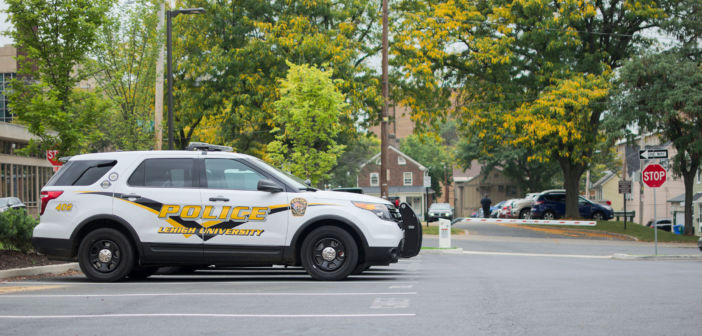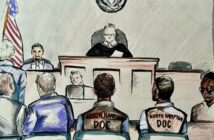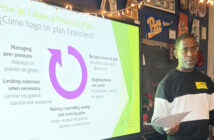Play.
A longtime Bethlehem resident is trying to put her children to bed. A party has been raging next door for 15 hours, since 10 a.m. Her window and door screen are broken and someone urinated on her front porch. Exasperated from yelling out her window, she calls the police.
Pause. Fast forward. Play.
A group of students are huddled around their unconscious friend, worried looks in their eyes. They assure an officer they tried giving him water to sober him up. The officer attempts to do a sternum rub and give him oxygen.
Pause. Fast forward. Play.
An officer attempts to wake a student who has passed out after consuming alcohol. Despite the flashlight in his face and his friends calling his name, the student doesn’t flinch.
Pause.
This is real body camera footage taken by Lehigh University police officers who patrol the community during the night shift. Lehigh Police Chief Edward Shupp showed the clips to students who came to him with concerns about increased police presence on and off campus.
“We’re not here to ruin anybody’s good time, we’re here to make sure that everybody’s safe,” said Shupp, who announced he will be retiring this January after 38 and a half years on Lehigh’s police force. “I certainly don’t want anybody to get seriously hurt or die here. I’ve seen enough of it.”
On Sept. 2, 59 people were arrested at a Phi Kappa Theta fraternity party off campus. Of the 59 citations, 56 were Lehigh students and 35 were first-year students. According to Bethlehem Police Department records, most students were charged with possession or consumption of alcohol. The homeowners were charged with disorderly house, and one member of Phi Kappa Theta was charged with furnishing alcohol to minors.
After the party, the university charged the fraternity with violating four areas of the Code of Conduct, including respect for self — unauthorized consumption, distribution or possession; respect for community — failure to report; respect for community — violating Lehigh social policy; and respect for community — encouraging others.
In his police report about the Sept. 2 incident, BPD officer John F. Limpar said he was patrolling in an “unmarked unit” when two sergeants notified him of a “large loud party” at 216 and 218 East Fifth St. According to the report, people had been spotted on the roof of one of the houses.
One eyewitness at the party, who spoke only on condition of anonymity because she is in the process of getting her citation expunged, said Bethlehem police arrived at 218 East Fifth and asked all party-goers for their IDs.
She admitted to having several drinks earlier in the night, but she remembers — and her account was corroborated by multiple witnesses who declined to comment on the record — BPD officers asked everyone who was under 21 to wait in a separate room. Since she fits that description, she waited as all of-age students were allowed to leave the house. Everyone under 21 stood silently for hours while they waited to be breathalyzed. She said she got to the front of the line around 4 a.m. and didn’t get home until 5 a.m.
The first arrest was logged at 12:37 a.m., according to the Bethlehem police documents. At least four officers were administering citations, and no “school resource officer” — or LUPD officer — was listed on the documents.
“I just thought they would have handled it like they have in the past, where they would say, ‘You’re being too loud,’ or they would just say, ‘Get out, party’s over,’” the eyewitness said. “It just seemed like such a quick switch that went off that we didn’t know about.”
The following weekend, 20 students were arrested for alleged underage drinking and five were hospitalized for high blood-alcohol contents, according to The Morning Call.
After these incidents occurred during the first two weekends of the semester, rumors started spreading on campus about police cracking down on parties.
In particular, a set of screenshots from a GroupMe chat were shared around campus, listing a number of facts Shupp allegedly told a student. The messages read:
So a (student) had a meeting with chief Ed Shupp.
Here are some summarized points:
- LUPD will shut anything down if they see anyone on door with a cup or people in the back with cups. Doesn’t matter if they are 21 drinking water. If they see people outside drinking period that is LEGAL probable cause to go check it out
- BPD will be trying to put into place an ordinance where a certain amount of citations would mean IMMEDIATE eviction.
- BPD also received a grant from the city to start raiding bars so watch out.
- Shupp said specifically they are trying to “Drastically increase the number of citations given.” When the girl asked him why and made the point it’s ruining careers he said “Student cited is significant less likely to go out and underage drink again for fear of expulsion.”
- LUPD will never lock the doors and cite everyone in there unless the home owner refuses to talk. However he mentioned the Phi Kap citations came from BPD, which he has no control over
- Finally, she asked how to safely party without getting in legal trouble and he said “You have a better chance of changing the drinking age than have me let unsafe parties happen.” He said to “stop trying to (il)legally drink under 21.”
Thought I’d pass that along. Stay safe guys.
The student is Madi Welker, ’19. She sent an email to President John D. Simon on Sept. 10 expressing concerns over the increased police patrol.
“This is not the Lehigh party scene we know and love as students,” Welker wrote in the email, “and we are starting to bond more over the fact that we are so upset with the social scene than we are bonding over how much we love Lehigh.”
Shupp was informed of the email and met with Welker Sept. 12. Welker said the purpose of talking with the chief was to ask him if he thought the police crackdown was promoting a safer party environment. She was skeptical.
Welker said although she raised many of the issues listed in the GroupMe message during her meeting with Shupp, she doesn’t want students to believe everything they read in the viral screenshots.
A list of bullet points she sent about the meeting to members of her sorority were redistributed to other groups on campus.
“I saw so many different versions of the message that I sent that at this point, it just got lost in communication,” Welker said.
When The Brown and White asked Shupp about these messages, he was also quick to dispel the rumors.
Any claims about LUPD shutting down parties or entering homes are unfounded, Shupp said.
“(BPD officers) don’t come on campus to deal with situations on campus,” Shupp said, “but off campus, it’s their jurisdiction.”
Shupp said LUPD will only tag along on operations if BPD specifically requests their assistance.
“What our guys will do is say, ‘Hey gang, you’re getting out of hand’ before the city gets a complaint,” Shupp said. “We do a little precursor. We’ll go by and try to give (students hosting off-campus parties) tips, say ‘Get people inside. Clean up the mess a little bit. Do something like turn the music down.’”
LUPD has what Shupp called “a great community policing partnership” with the BPD. In fact, the current chief, Mark DiLuzio, used to work for Lehigh.
A representative answering a call requesting information said DiLuzio is on vacation this week and could not be reached for comment about the recent spike in off-campus citations.
However, Shupp and DiLuzio collaborated to send out a cautionary email to Lehigh students Sept. 18.
As for the rumor about BPD receiving a grant from the city to start raiding bars, Shupp said it’s not true. Bethlehem and Lehigh both received a grant from the Liquor Control Enforcement Board for safety, education and enforcement.
Shupp said his main concern is the safety of the Lehigh community, which sometimes means initiating more arrests in an effort to curb unsafe drinking habits.
“Complaints are constantly coming in that police are doing this — do students ever take responsibility?” Shupp asked. “If you get to a .29, how’d you get to a .29? I didn’t drink for you. You drank. So where is that accountability?”
Four students had near-death experiences last semester as a result of excessive partying. Shupp said another student — one of the men in the LUPD body camera footage — spent three days in the intensive care unit for alcohol poisoning.
Shupp said if anything throws up a red flag — for example, the four near-death incidents or increased citations — he will increase patrols, even though it’s at “a heck of a cost.” He said LUPD would always prefer to educate than enforce.
“We rather come in and slap you on the hand instead of slapping the cuffs on you,” Shupp said.
In their email to Lehigh students, Shupp and DiLuzio made it clear students can be arrested for the illegal consumption of alcohol, either by the city or the university.
However, Shupp had some tips for how students can still have fun without sacrificing their social lives.
“Don’t draw attention to yourself — the public urination, the staggering, the stumbling, the littering, the loud behavior, the obscenities,” Shupp said. “Respect people’s homes and properties.”
The last important component, Shupp said, is bystander intervention. He said it’s essential that students look out for each other and call medical amnesty if they’re concerned about a friend. His advice to students is if they go out with three people, go home with those same three people.
Several students, including Welker, have spoken out about how the increased police presence has shifted the social dynamic at Lehigh.
“This is the best four years of our lives, and we’re trying to live it to our fullest but right now the school is stopping us from doing so,” Welker said. “I think by no means (do) we need to be publicly drunk walking around East Fifth. I just think we’re all trying to find a happy medium to be able to celebrate our four years.”






Comment policy
Comments posted to The Brown and White website are reviewed by a moderator before being approved. Incendiary speech or harassing language, including comments targeted at individuals, may be deemed unacceptable and not published. Spam and other soliciting will also be declined.
The Brown and White also reserves the right to not publish entirely anonymous comments.
8 Comments
People that live in town have a right to a quiet & safe neighborhood & parties with underage drinking in those neighborhoods should be shut down immediately by BPD.
Parties need to move back on campus where campus police can deal with it. Any student that has an issue with that is totally insensitive & needs to think of the neighbor as their parents living next door to understand why this insane behavior cannot be tolerated
As a student, I believe I speak for most of us in saying that we would love to have parties on the hill rather than off campus. Lehigh social policies have forces frats off campus by having no tolerance for any parties on the hill. If a fraternity is caught with a keg or hard alcohol on the hill, they would be put on deferred dissolution or kicked off immediatley. President Simon, and the new dean of students Ricardo Hall, need to realize that their current tactic of just telling students to stop drinking won’t work. They need to work with students and help find a compromise that will ensure safety for students, and help the Bethlehem community as a whole
There are 8 parties on the hill this weekend. How is this having “no tolerance”? Looks like someone else needs to check his own rumors.
How is this filed under the news section? The article was completely editorialized at the beginning. I am recent alum of Lehigh and have been to a good number of parties before the university cracked down and, even then, I’ve never heard of any 15 hour parties where students attempted breaking into a neighbor’s house…
I’ve been following this sort of problem for almost 20 years. See this article by retired Professor McIntosh:
http://www.lehigh.edu/~ijm1/oped.htm
Also, see the “Lehigh and Dry” essay on page 4 of this link:
http://www.discoverthenetworks.org/Articles/1999%20october.pdf
Back then, Lehigh instituted a program called Project Impact which morphed into a program with a new name called A Matter of Degree. These failed miserably, in that they did not reduce the level of student drinking.
As I recall, Lehigh even provided the Bethlehem Police with extra funds to increase patrols and crackdowns in areas adjoining the campus.
Furthermore, Lehigh also instituted the absurd draconian social policies which are still in place today and are so obnoxious and costly to comply with that the fraternities and sororities have pretty well given up holding registered parties on campus.
In order to try and get around these policies, students increasingly decided not to live in Lehigh housing and opted to rent places in town.
As a result, Lehigh found that it was having a bunch of vacant rooms in its housing stock and was losing money. That is when it instituted the rule that requires first and second year students to live in Lehigh supplied housing.
The absurd social policies had a number of unintended consequences. These include the practice of “pregaming” See:
https://en.wikipedia.org/wiki/Pregaming
Also, the students started increasing their use of drugs as they were less detectable than alcohol.
The move by upper classmen – especially seniors, to live off campus has had markedly negative consequences on the fraternities.
With the seniors opting to no longer live in the fraternity houses, the fraternities are run by the remaining sophomores and juniors. Thus they lose the insights and mentoring by their most seasoned members.
My view is that these collective negative and unintended consequences are a direct result of the long tenure of John Smeaton as head of student affairs. While he would never openly admit to it, it would appear that he worked tirelessly to undermine the Greek social traditions and institute no end of utterly ridiculous über liberal nonsense in other areas as well.
Fortunately, Smeaton is now retired and gone from direct control. But unfortunately, as I look at Lehigh’s organization chart, Smeaton is shown as a Special Assistant reporting directly to President Simon.
Now that Ricardo Hall is head of Student Affairs, President Simon should stop using Smeaton as special assistant.
Let’s hope that Ricardo Hall takes a fresh look at what has been going on and makes some major policy changes.
If the school has so many people who are so intent on drinking themselves silly all the time, maybe the problem is with admissions.
Drinking age is 21. Deal with it or pay the consequences.
Thanks, Mom. The highly renowned students of Lehigh were previously unaware of this recent law change increasing the drinking age from 18 to 21 from 1984.
Give me a break, cracking down on alcohol consumption has never had any positive societal outcomes. Anyone else remember what happened during prohibition? Hell, one of the Lehigh fraternities actually has a speakeasy bar in the basement as a direct result from that effort. I believe cracking down on students means that they will simply find other outlets/vices and in most cases when this happens, you can expect to be looking at an increased drug problem instead of an alcohol issue.
In short, Lehigh has put too much in writing at this point and so they cannot legally allow parties on the hill, yet students still have a need to blow off steam. This leaves the off-campus environment to their disposal, which, aside from being incredibly crime ridden, is extremely dirty and just downright unsafe. Additionally, there are families and private residents living directly off campus that would prefer not to deal with partying college students. So when you’re stuck between a rock and a hard place, which would you choose? Run the risk of your chapter’s existence by having a party on campus or take your chances off campus and hope that your fellow students don’t get jumped/injured AND the police won’t show up at your door?
Finally, during the events that unfolded from the 59 citations at Phi Kappa Theta, there was a mention from an officer about the horrific living conditions the landlords are allowed to get away with, yet instead chose to shift their focus to the freshmen who had a few beers at a college party. This alone should symbolize where higher authority’s priorities truly are.